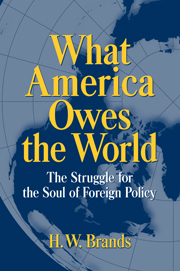Book contents
- Frontmatter
- Contents
- Preface
- 1 Exceptionalists All! The First Hundred Years
- 2 Brooks Adams: Marx for Imperialists
- 3 Walter Lippmann and a New Republic for a New Era
- 4 When the Future Worked and the Trains Ran on Time: Lincoln Steffens
- 5 Dr. Beard's Garden
- 6 Kennan, Morgenthau, and the Sources of Superpower Conduct
- 7 Reinhold Niebuhr and the Foreign Policy of Original Sin
- 8 God Blinked but Herman Didn't
- 9 On Wisconsin: Madison and Points Left
- 10 The Brief of Norman's Woe: Commentary and the New Conservatism
- 11 It Ain't Over till It's Over – and Not Even Then
- Note on Sources
- Index
4 - When the Future Worked and the Trains Ran on Time: Lincoln Steffens
Published online by Cambridge University Press: 25 March 2010
- Frontmatter
- Contents
- Preface
- 1 Exceptionalists All! The First Hundred Years
- 2 Brooks Adams: Marx for Imperialists
- 3 Walter Lippmann and a New Republic for a New Era
- 4 When the Future Worked and the Trains Ran on Time: Lincoln Steffens
- 5 Dr. Beard's Garden
- 6 Kennan, Morgenthau, and the Sources of Superpower Conduct
- 7 Reinhold Niebuhr and the Foreign Policy of Original Sin
- 8 God Blinked but Herman Didn't
- 9 On Wisconsin: Madison and Points Left
- 10 The Brief of Norman's Woe: Commentary and the New Conservatism
- 11 It Ain't Over till It's Over – and Not Even Then
- Note on Sources
- Index
Summary
Walter Lippmann wasn't the only one disillusioned by the outcome of the war. The compromises Britain and France forced on Wilson at Paris repelled most American liberals – and many foreign ones, including John Maynard Keynes, who stomped out of the negotiations and tore off his scathing Economic Consequences of the Peace. The conservative opposition in America to even Wilson's attenuated treaty, combined with the president's refusal to budge the extra couple of inches that might have made the pact acceptable to the Senate, delivered the coup de grace to liberal hopes for a noble and lasting peace.
Not since before the Spanish-American War had the exemplarists held the advantage in American thinking on foreign affairs; now, with vindicationism clearly a bust, they began to reclaim lost ground. The first signs of the exemplarist revival took the form of retrospective assaults on Wilson's conduct of the war. Harry Elmer Barnes rejected the comforting notion that Germany bore primary responsibility for the conflict. Calling the war “the greatest crime against humanity and decency” since man's descent from the apes, Barnes identified the principal culprits as the leaders of France and Russia, with the British being accessories. As for the United States, he denied the causal role of German submarine warfare – which he characterized as “legitimate retaliation against the British violations of international law” – in triggering American entry. According to Barnes, Wilson's avowed neutrality had been a sham for many months prior to his request for a war declaration.
- Type
- Chapter
- Information
- What America Owes the WorldThe Struggle for the Soul of Foreign Policy, pp. 79 - 108Publisher: Cambridge University PressPrint publication year: 1998



